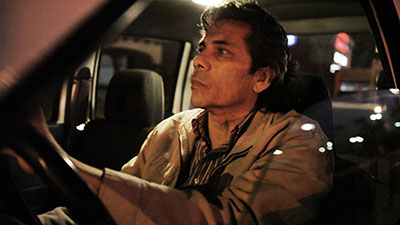A week before Sunday’s crucial presidential elections in Mexico, CPJ participated on a panel with filmmaker Bernardo Ruíz and Mexican journalist Sergio Haro about the perilous conditions for journalists in that country, where CPJ research shows 48 journalists have been murdered or disappeared since outgoing President Felipe Calderón took office in December 2006.
The occasion was the screening of Ruiz’s new documentary, “Reportero,” at the Human Rights Watch Film Festival at Lincoln Center in New York. “Reportero,” which will be shown in the United States on PBS this fall, tells the remarkable story of the Tijuana-based weekly magazine Zeta, one of the only publications to regularly publish investigations on organized crime, drug trafficking, and corruption in Mexico’s northern states since its founding in 1980. Zeta‘s staff has born a particularly bloody toll for its reporting over the decades: Héctor Félix Miranda, co-founder of the magazine, was assassinated in 1988, and co-editor Francisco Ortiz Franco was murdered in 2004. The magazine’s other founder, J. Jesús Blancornelas, survived an assassination attempt in 1997. The attempt failed only because the lead assassin was killed by one of his own gunmen when a bullet ricocheted and struck him in the eye.
“Reportero”‘s protagonist is Zeta journalist Sergio Haro, whose quiet, stoic presence complements that of editor Adela Navarro, who Haro deems the weekly’s “quarterback,” for her aggressive support of her staff. Both narrate the tragic history of Zeta and Mexico in the past 30 years. The filmmaker adds a poetic touch to the journalistic process: His camera follows the magazine’s production from close-ups of thick glops of ink at the printing press (the magazine is printed in the U.S. and shipped over the border every week to “guarantee our freedom of expression,” Navarro says) to crumbling heaps of garbage at a landfill Haro visits in an attempt to do a social story. Echoing the lament of journalists everywhere, he complains that such stories get pushed aside to satisfy readers who would be happiest if Zeta was “dripping in blood.”
At the panel discussion, Haro said that while he was uncomfortable with his transformation from journalist to protagonist, he is thankful that the film is raising awareness about the constant danger Mexican journalists face. Though the movie narrates what seems like near-constant bloodshed at Zeta, the most lethal period for the Mexican press actually began after the events in the documentary took place and continues to this day.
To cover these issues, “you need to have an enormous amount of courage,” said CPJ’s senior program coordinator for the Americas, Carlos Lauría, noting that the “most devastating consequence of this climate has been rampant self-censorship.” In a context in which multiple news outlets have published despairing editorials stating they will no longer cover local violence out of fear for their safety, Zeta‘s sustained coverage is particularly notable.
Compounding Mexico’s problem is a culture of rampant impunity. The country’s placed eighth this year in CPJ’s Impunity Index, which spotlights countries where journalists are murdered regularly and killers go free. Haro said he and his fellow journalists would like to see their investigations have more impact, yet he noted that “everyone has their role. The journalist’s role is to denounce. But the police and the justice departments have their own roles, and that is where the chain is breaking.” Systems of accountability in Mexico, up to the executive branch, are deeply flawed, CPJ research shows, and this has repercussions for all of Mexican society. “The Mexican state is not guaranteeing journalists’ right to practice their profession, which is important work for democracy, and the violence is the affecting the right of all citizens to freedom of expression and other rights enshrined in the Constitution,” Lauría said. With this at stake, he noted, it is disappointing that none of the presidential candidates have made protecting the press a campaign issue.
Audience members pointed out that this is an election year in Washington too, and that as a provider of both arms and demand, the U.S. should grapple with its role in the drug trade. Ruíz urged international reporters to pick up the story of what happens when drugs and money cross out of Mexico, and follow the trail into their own countries.
Haro expressed skepticism that Sunday’s results, whatever they are–polls suggest the PRI political party that ruled Mexico for most of a century may be swept back into power after a 12-year hiatus–will make a difference. “Whoever wins,” he said, “this mess is not something I believe one party in particular will resolve. Mexican citizens are going to have to keep pushing.”
